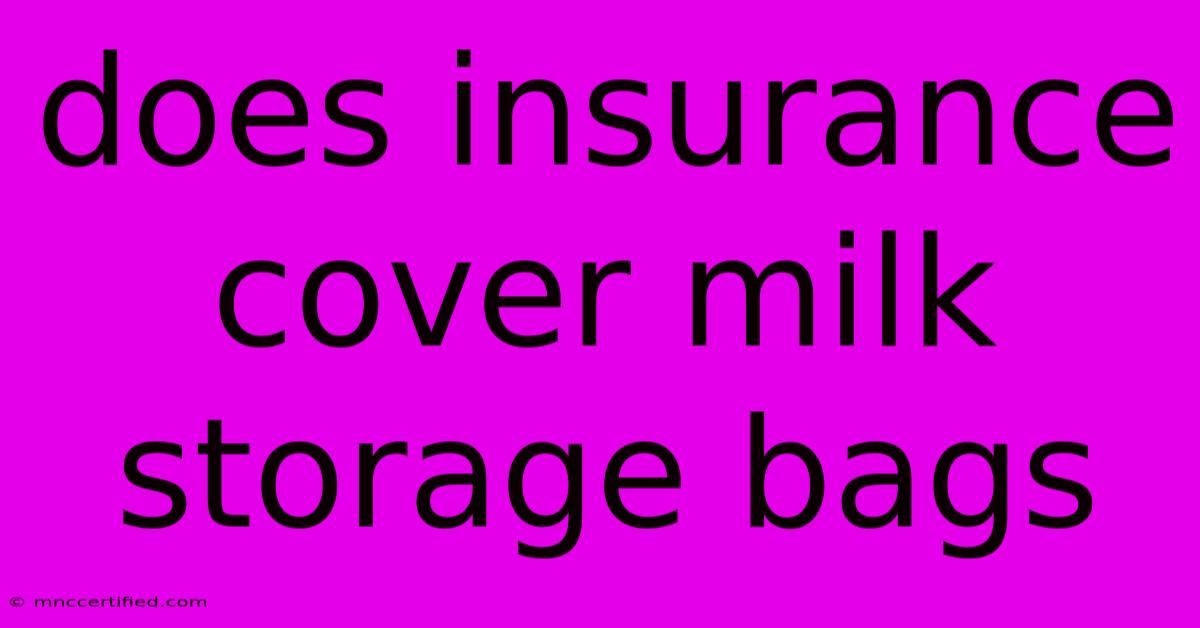Does Insurance Cover Milk Storage Bags

Table of Contents
Does Insurance Cover Milk Storage Bags? A Comprehensive Guide
Storing breast milk is a crucial part of breastfeeding for many parents. Milk storage bags offer a convenient and safe way to preserve this precious liquid gold. But what happens when these bags get damaged or lost? Does insurance cover them?
The answer, unfortunately, is not always. It depends on several factors, including your specific insurance policy, the cause of the damage, and whether the bags were purchased for medical purposes.
Understanding Insurance Policies
Most health insurance policies do not explicitly cover milk storage bags. These bags are generally considered "personal items" and not directly related to medical treatment.
However, there are a few exceptions:
- Some policies might cover milk storage bags as part of a "maternity benefit." This benefit usually covers essential supplies for breastfeeding mothers, which may include milk storage bags.
- If your doctor prescribes milk storage bags for medical reasons, your insurance might cover them as a "durable medical equipment" (DME). This often applies in cases of premature babies or mothers with specific medical conditions that require special storage procedures.
It's crucial to review your policy documents carefully and contact your insurance provider directly to inquire about coverage for milk storage bags.
Other Considerations
Besides policy specifics, several factors influence whether your insurance might cover damaged or lost milk storage bags:
- Cause of damage: Accidental damage, like spills or leaks, is unlikely to be covered by insurance. However, damage caused by a covered event, such as a fire or flood, may be eligible for reimbursement.
- Purchase details: If you purchased the bags with a credit card, you might have additional coverage for damage or loss. Check your credit card agreement for details.
- Homeowner's or renter's insurance: If you have a comprehensive homeowner's or renter's insurance policy, it might cover lost or damaged personal items, including milk storage bags. However, this usually comes with a deductible, and the coverage might be limited based on the value of the items.
Tips for Maximizing Coverage
- Keep detailed receipts: This will help you claim the cost of the bags if you need to file a claim with your insurance or credit card company.
- Consider additional coverage: If your existing insurance doesn't cover milk storage bags, consider adding a rider to your policy or obtaining separate insurance for personal items.
- Store your bags safely: Properly storing your milk storage bags in a safe, secure location can help minimize the risk of damage or loss.
Ultimately, the best way to determine if your insurance covers milk storage bags is to contact your insurance provider directly. They can provide you with specific information regarding your policy and coverage options.

Thank you for visiting our website wich cover about Does Insurance Cover Milk Storage Bags. We hope the information provided has been useful to you. Feel free to contact us if you have any questions or need further assistance. See you next time and dont miss to bookmark.
Featured Posts
-
Aldi Cheese Recall What You Need To Know
Nov 09, 2024
-
Property And Casualty Insurance Course
Nov 09, 2024
-
Tony Todd Dies Candyman Star Passes Away
Nov 09, 2024
-
Hugh Grants Dark Turn In Heretic
Nov 09, 2024
-
Z Palka Metropolitan Insurance Agency
Nov 09, 2024